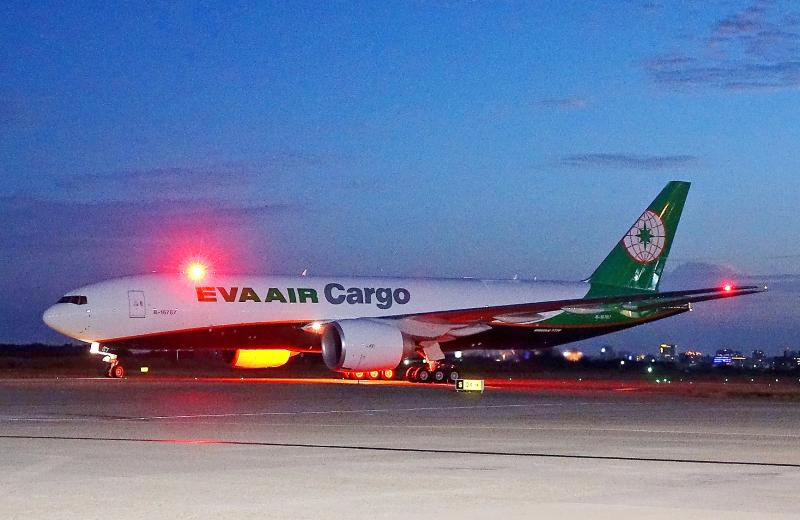EVA Airways Corp (長榮航空) on Friday received a new Boeing Co 777F cargo jet, the first delivery of a freight aircraft for the airline in two years.
Prior to taking possession, EVA Airways’ cargo fleet had five Boeing 777F jets that it received in 2019.
The airline expects to take delivery of another two Boeing 777Fs next month and in December, it said in a statement.

Photo: Chu Pei-hsiung, Taipei Times
EVA last year canceled orders for seven Boeing 787-10 Dreamliner passenger jets, replacing them with orders for three 777F cargo aircraft and four smaller 787-9 passenger jets, as the airline faced low demand for air travel but robust orders for air shipping.
Due to strong cargo demand, EVA currently conducts more than 40 cargo flights a week with its five freight carriers, and operates another 50 cargo flights per week with its 33 passenger jets, with goods loaded in the passenger cabins, it said.
The three new freight aircraft would boost cargo capacity and increase revenue this year, EVA said.
The sixth cargo jet would be utilized for flights to Southeast Asian countries and North America, it said.
With strong demand for transport of new electronic products and mobile devices in the peak season, the company holds an upbeat outlook for its cargo business this quarter, EVA president Clay Sun (孫嘉明) said in the statement.
Airfreight rates are likely to remain high next year due to a tight supply of cargo flights and congestion at the world’s major seaports, Sun said.
The International Air Transport Association has predicted that global air cargo volume for this year is expected to be higher than in 2019, and is projected to grow 4.9 percent year-on-year next year, EVA said.
The Boeing 777F is the largest twin-engine, energy-efficient freighter, and as the aircraft has identical engine specifications as the Boeing 777-300ER, of which EVA has 34, the airline could reduce its maintenance costs and boost maintenance efficiency with the consistent fleet, it said.

GROWING OWINGS: While Luxembourg and China swapped the top three spots, the US continued to be the largest exposure for Taiwan for the 41st consecutive quarter The US remained the largest debtor nation to Taiwan’s banking sector for the 41st consecutive quarter at the end of September, after local banks’ exposure to the US market rose more than 2 percent from three months earlier, the central bank said. Exposure to the US increased to US$198.896 billion, up US$4.026 billion, or 2.07 percent, from US$194.87 billion in the previous quarter, data released by the central bank showed on Friday. Of the increase, about US$1.4 billion came from banks’ investments in securitized products and interbank loans in the US, while another US$2.6 billion stemmed from trust assets, including mutual funds,

Micron Memory Taiwan Co (台灣美光), a subsidiary of US memorychip maker Micron Technology Inc, has been granted a NT$4.7 billion (US$149.5 million) subsidy under the Ministry of Economic Affairs A+ Corporate Innovation and R&D Enhancement program, the ministry said yesterday. The US memorychip maker’s program aims to back the development of high-performance and high-bandwidth memory chips with a total budget of NT$11.75 billion, the ministry said. Aside from the government funding, Micron is to inject the remaining investment of NT$7.06 billion as the company applied to participate the government’s Global Innovation Partnership Program to deepen technology cooperation, a ministry official told the

Taiwan Semiconductor Manufacturing Co (TSMC, 台積電), the world’s leading advanced chipmaker, officially began volume production of its 2-nanometer chips in the fourth quarter of this year, according to a recent update on the company’s Web site. The low-key announcement confirms that TSMC, the go-to chipmaker for artificial intelligence (AI) hardware providers Nvidia Corp and iPhone maker Apple Inc, met its original roadmap for the next-generation technology. Production is currently centered at Fab 22 in Kaohsiung, utilizing the company’s first-generation nanosheet transistor technology. The new architecture achieves “full-node strides in performance and power consumption,” TSMC said. The company described the 2nm process as

JOINT EFFORTS: MediaTek would partner with Denso to develop custom chips to support the car-part specialist company’s driver-assist systems in an expanding market MediaTek Inc (聯發科), the world’s largest mobile phone chip designer, yesterday said it is working closely with Japan’s Denso Corp to build a custom automotive system-on-chip (SoC) solution tailored for advanced driver-assistance systems and cockpit systems, adding another customer to its new application-specific IC (ASIC) business. This effort merges Denso’s automotive-grade safety expertise and deep vehicle integration with MediaTek’s technologies cultivated through the development of Media- Tek’s Dimensity AX, leveraging efficient, high-performance SoCs and artificial intelligence (AI) capabilities to offer a scalable, production-ready platform for next-generation driver assistance, the company said in a statement yesterday. “Through this collaboration, we are bringing two